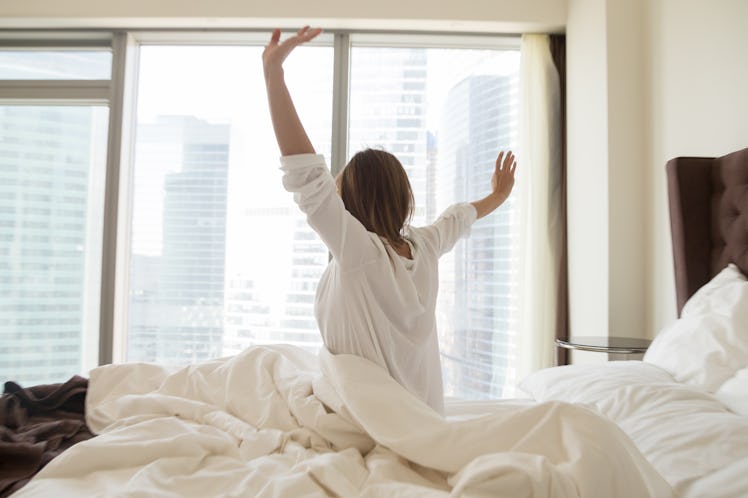
Science Says Regular Exercise Can Make Your Dreams More Vivid, But There's A Catch
As a self-proclaimed athlete, I can vouch for the fact that there's no better sleeping experience than the snooze you'll take after a long, hard workout. It's a no-brainer that physical activity -- while it builds muscle, gets your heart rate up, and keeps your blood flowing -- can be extremely exhausting. The harder the workout is, the deeper you tend to sleep. But how does exercise affect your dreams once you've actually drifted off for the night?
According to the American Sleep Apnea Association, regular exercise is crucial for a good night's sleep, and the best time to do so is roughly an hour before the time you're accustomed to crawling into bed. But in addition to bettering your sleep quality, workouts can make your dreams a little more interesting as well.
Of course, we have to read the fine print here because, as is the case with anything related to how something affects the body, how exercise affects your dreams is all circumstantial.
For example, a 2013 study performed at the Appalachian State University in North Carolina, found that working out early in the morning would guarantee you a good night's rest, but hardly any dreaming. The research comes as a result of 20 adult participants engaging in a moderately intensive 30-minute workout at different times throughout the day, in which case morning workouts led to less time in REM sleep (the duration of time where we dream the most throughout the night).
However, engaging in regular aerobic exercise has been linked to vivid dreaming.
Christopher Bergland, author of The Athlete's Way: Sweat and the Biology of Bliss, explained in an article for Psychology Today that REM sleep has been directly linked to parts of the brain associated with memory. Additionally, he noted that regular aerobic exercise -- such as walking, swimming, and bicycling -- plays a key role:
Regular aerobic exercise, sleeping well, and vivid dreams go hand-in-hand. Regular exercise allows you to sleep deeper and dream better. The more regularly you exercise, the better you will sleep, the more you will dream during REM sleep, and the more of a creative powerhouse you will become.
Sorry to break it to you #TeamCardiNo, but it looks like getting your heart rate up is an essential component to lively night visions.
This is because high activity levels naturally stimulate mental activity.
For example, when you do a low-intensity yoga practice and flow in and out of graceful movements, your mind is most likely going to feel calm. But when it comes to other types of exercise, like interval sprints and cross training -- which require high energy and fast, sporadic movement -- adrenaline peaks and your mind is striving to keep up with your body.
Sleep writer and expert from Sleep Train Kelsey Down tells Elite Daily,
A likely reason for this correlation is that high activity levels might lead to increased mental activity and stress levels as you prepare for sleep. People under high levels of stress may experience more stressful dreams and nightmares.
When your mind is overactive, your dreams are too. Nightmares are often your subconscious mind making sense of real life situations or stress.
While I absolutely would not suggest purposely putting yourself in stressful situations just to see what'll happen in your dreams, it's still cool to know the correlation exists, for better or for worse.
The time of day you decide to exercise can affect dreams, too.
Timing is everything, so they say, and apparently it rings true for exercise and sleep quality.
When it's time to turn in for the night, ideally you want your body temperature leveled and your adrenaline low so that it's easier to wind down. Physical activity spikes your heart rate and body temperature: two not-so-minute details when it comes to bedtime.
But let's say you're operating on a tight schedule that doesn't allow much wiggle room for exercise. In that case, taking a long, cool shower post-workout will give you enough time to both lower your body temperature, and properly digest anything you might have snacked on after exercising.
You could also trade a high-intensity workout for a more low-impact alternative, like a yoga practice or a walk around the neighborhood. Regardless, choose what feels best for your body, rather than what's going to give you the most vivid dreams.
Sleep tight!